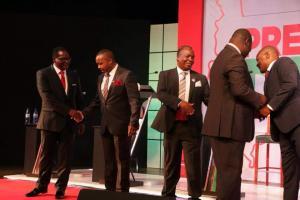
The much touted and awaited Tripartite General Election (TGE) is few days away. Malawi is going to decide the next five years. The future is in Malawians’ hands.
A total of seven candidates have put across their bid to contest for the presidency come may 21.

There is with no doubt a lot more news coverage and media bubbling around on the coming elections. But with this noise looming around, it is easy for the local citizenry to be misinformed on the right choice of at least a maybe better candidate.
Are we, Malawians not responsible to pay much attention to the minute traits of our candidates, starting at local level, constituency and national level? But what general qualities should a candidate have?
Do we have such a litmus scale to weigh our candidates? The people to be elected on 21 May are the people to hold council positions, to make laws and occupy the Sanjika house, make decisions on issues significant to the country and represent Malawi.
This is not a mean thing; candidates need to display the qualities the electorates need. But the question is the same; do the electorate know their candidates? Do we have the checklist for the candidates or maybe partisanism steals our critical gaze at our candidates?
Much of the talkings border on how to run the elections, the methodologies. There is a number of initiatives on both voter and civic education on how to vote but very little of the kind on telling the electorates the nature of candidates they have on the ballot paper.
Except in few instances, MEC and other NGOs have managed to try to provide voters with messages on voting wisely and voting issue based candidates but this arguably seems to be very little in giving out explicit details of the nature of people the candidates are in undertaking public duties.
Both voter and civic education which are done by a number of institutions such as MEC, religious groups, political parties and other NGOs aim mainly as it has been seen at providing specific information about how voting is to be conducted.
They usually deal with the specific steps to be followed when voting. Although this is the case, it’s a well-known fact that political parties have miserably failed in this because they are mostly concerned with imparting partisan messages that will make them win the elections.
These messages are in most cases biased and aim at painting their candidates with the imagery they are not. It might be the same reasons MEC and other NGOs do not go into the nitty-gritties of the candidates, afraid of being viewed as campaigning or de-campaigning other candidates.
More importantly, the debates conducted by Zodiak in conjunction with other media houses play a pivotal role in showing the general public some hidden behaviours of the candidates as they sell themselves in front of voters. But the question(s) still remains the same, were those debates enough to school the citizenry of the candidates applying for various public posts? Were the debates really carrying the meaning of the word debate? Were the candidates portraying the much anticipated qualities? What about those candidates who shun away from such endeavour, where will the electorates know them?
Yes, the debates are not the only podiums to know our candidates, but do political parties have deliberate structures for the local people to talk and ask their candidates relevant questions on their candidature? Similarly, the parties’ manifestos with much embellishments are doctored by many just to lure the voters do not serve in any little way to show the citizenry the behaviours of their candidates in fulfilling the stipulated promises in the said booklets.
As Joseph Asunka writes: “While popular participation in the political process is essential for democratic development, the degree of partisan attachments among citizens has important implications for political accountability and the proper functioning of democracy and the overall welfare of citizens”.
He further states that “when voters grow strongly attached to and prioritise electoral victory of their favourite parties over other considerations, electoral control of politicians suffers.”
Thus, the strong partisanship reduces voter responsiveness to politicians’ performance and undermines their ability to remove corrupt and nonperforming politicians from office (Eggers, 2014).
Therefore, less knowledge on the candidates we vote for and more partisanism reduces elected officials’ incentives to exert energy toward providing quality basic services to their areas, constituencies and the nation at large.














